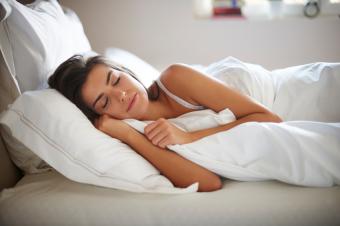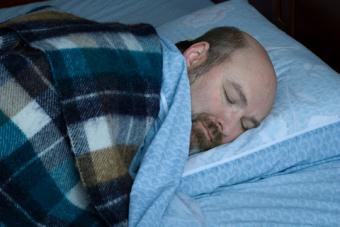
Looking for ten easy tips for a better night's sleep? You are not alone. Sleep is critical for physical, mental and emotional health; however, many people are unable to get the rest they need. Try these easy tips. They can help you get a better night's sleep.
Ten Easy Tips for a Better Night's Sleep
Preparing for a better night's sleep begins in the morning and continues through the end of the evening. Daily habits including diet and exercise contribute to your ability to sleep well. Here are ten easy tips for a better night's sleep, divided into tips for day and night.
Daytime Sleep Tips
- Rule out medical problems. The first step to getting better sleep is to see your doctor. Make sure to discuss any sleep problems you are experiencing in detail. In some cases, a physical ailment can be the source of sleep problems. Addressing the illness may alleviate the symptom of insomnia or other sleeping disturbances. Before adopting any tips into your routine, it is important to first rule out any medical problems.
- Exercise during the day. Daytime exercise can help set your body's circadian rhythm as well. Ideally, the workout should occur in the morning or early afternoon. Exercising in daylight offers the added benefit of light exposure, strengthening the sleep-wake cycle.
- Take time to relax during the day. A little unwind time during waking hours can improve sleep, whether you choose meditation, yoga or other calming practice.
- Eat dinner early. A heavy meal can interrupt sleep during the night if you eat too late. Schedule dinner at least three hours before bedtime.
- Prepare for sleep. Preparing for sleep during the day involves giving your day closure. Some people like to make lists while others give themselves "worry time" well before bedtime.
Nighttime Sleep Tips
- Make a sleep schedule. Sleep hygiene involves establishing a specific bedtime. Consistency is important and it is ideal to follow your sleep schedule on the weekends, if possible.
- Create a good sleep environment. Make sure that your mattress and pillows are comfortable and dress them in soft sheets. Keep the room temperature cool because your body temperature naturally drops during sleep.
- Turn out the lights. Your body has an internal clock that is triggered by the environment. Getting a lot of light during the day followed by little light at night naturally leads to feeling sleepy. The dark environment stimulates the release of melatonin, a sedating hormone that helps people sleep. The article, Pineal Gland and Melatonin explains the connection between light, the pineal gland and melatonin.
- Shut off the television. Television, like light, can interfere with natural circadian rhythms. It is especially important to keep the television out of the bedroom.
- Don't fret. Worry is a considerable problem because shutting the brain off to sleep involves transitioning from active to calm states of mind. Some people's sleep patterns may include waking in the middle of the night, making this a natural occurrence. Worrying about waking up can feed a vicious cycle that further disrupts sleep.
| 1 | Face your clock away from the bed |
| 2 | Have a light snack before turning in |
| 3 | Follow the same nighttime routine consistently |
| 4 | Limit bed activities to sleep and intercourse exclusively |
| 5 | Avoid alcohol, caffeine and nicotine |
| 6 | Avoid drinking too much liquid close to bedtime |
| 7 | Try to skip daytime naps |
| 8 | Begin your bedtime routine about one hour before turning in |
| 9 | Go to bed when you feel tired |
| 10 | If you don't fall asleep or can't stay asleep, get out of bed |
Getting Sleep Help
The right support can make all the difference when it comes to improving sleep. In some cases, it may be necessary to talk to a professional about therapeutic approaches like cognitive behavioral therapy for sleep problems. In addition, some of the simple tips may not be appropriate for everyone so it is important to discuss the options with your physician.







